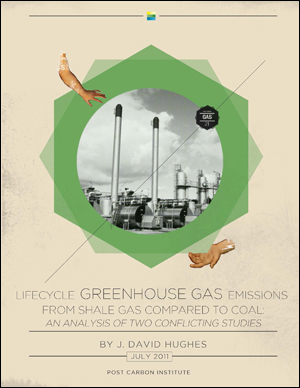
Life Cycle Greenhouse Gas Emissions from Shale Gas Compared to Coal: An Analysis of Two Conflicting Studies
June 30, 2011
A recent series of studies and rebuttals have debated the greenhouse gas impacts of shale gas production as compared to coal. Here, Post Carbon Institute Fellow David Hughes, author of the groundbreaking report, “Will Natural Gas Fuel America in the 21st Century?”, provides an analysis of two conflicting studies. His conclusion: Shale gas is worse than coal for the climate over a 30-50 year timeframe, depending upon the technology used.
Abstract
Two studies with conflicting conclusions have recently been produced on full cycle greenhouse gas emissions from shale gas production, one from scientists at Cornell University and another from a scientist at the National Energy Technology Laboratory (NETL). The Cornell study, published in a peer-reviewed journal, suggests that life cycle greenhouse gas (GHG) emissions from shale gas are 20%-100% higher than coal on a 20 year timeframe basis, especially considering that 70% of natural gas consumption is not used for electricity generation. The NETL study, presented in a talk at Cornell University and later posted on the NETL website, suggests, on an electricity-generation comparison basis, that natural gas base load has 48% lower GHG emissions than coal on a 20 year timeframe basis. The NETL comparison, however, does not single out shale gas, which is projected by the U.S. Energy Information Administration (EIA) to be the major source of natural gas supply growth going forward, or the overall emissions from natural gas-fired electricity generation, focusing instead on the more efficient base load combined cycle component. When the assumptions of the NETL study are examined in detail, and compared to the U.S. Environmental Protection Agency (EPA) 2009 emissions inventory for natural gas, as well as the likely ultimate production from shale gas wells, the resulting conclusions are not significantly different than the Cornell study. Shale gas full cycle greenhouse gas emissions are higher than coal when comparing both the existing electricity generating fleets and best-in-class electricity generation technologies for both fuels over a 20-year timeframe basis, and lower than coal on a 100-year timeframe basis. This has significant policy implications for utilizing natural gas as a “transition” fuel to a low carbon future in mitigating near term greenhouse gas emissions.
